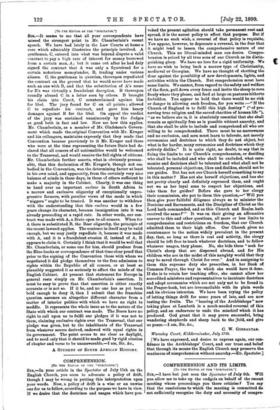COMPREHENSION.
[TO THE EDITOR OF TIIE "SPECTATOR."]
Sin,—In your article in the Spectator of July 15th on the English Church, you seem to advocate a policy of drift, though I may be wrong in putting this interpretation upon your words. Now, a policy of drift is a wise or an unwise one for us to follow, according to the purpose we have in view. If we desire that the doctrines and usages which have pro- yoked the present agitation should take permanent root and spread, it is the surest policy to effect that purpose. But if we have no such wish, a reversal of that policy is requisite. You appear, however, to deprecate a reversal, in the fear that it might tend to lessen the comprehensive nature of our Church. This no liberal-minded man can desire. Compre- hension is prized by all true sons of our Church as its distin- guishing glory. We have no love for a rigid uniformity. We have no wish to bring back a narrow type of Christianity, medimval or Georgian. We have no thought of shutting the door against the possibility of new developments, lights, and activities within the Church. But comprehension must have some limits. We cannot, from regard to the safety and welfare of the flock, pull down every fence and invite the sheep to rove freely where they please, and feed at large on pastures hitherto forbidden. You appear to hold that there would be no risk or danger in allowing such freedom, for you write :—" If the Church of England is to fulfil this high destiny" (" of pre- serving true religion and the sacred charities of human life "), " as we believe she is, it is absolutely essential that she shall remain as spiritually free as is possible without anarchy, and that she shall be able to include and comprehend all who are willing to be comprehended. There must be no narrowness and no exclusion, and men must learn to tolerate, not merely ceremonies and doctrines to which they do not object, but what is far harder, many ceremonies and doctrines which they actively dislike." It is quite right, no doubt, to say that in I fixing the limits to our Church's comprehension, or deciding ; who shall be included and who shall be excluded, what cere- monies and doctrines shall be tolerated and what shall not be tolerated, personal objections, likes and dislikes, should not be our guides. But has not our Church herself something to say I in this matter? Has not she herself objections, and has she I not pretty clearly and definitely expressed them, and ought I not we as her loyal sons to respect her objections, and take them for guides? Before she gave to her clergy their commission, she put to them this question,—" Will you then give your faithful diligence always so to minister the Doctrine and Sacraments, and the Discipline of Christ as the Lord hath commanded, and as this Church and Realm hath received the same P" It was on their giving an affirmative answer to this and other questions, all more or less limits to comprehension and restrictions on freedom, that our Church admitted them to their high office. Our Church gives no countenance to the notion widely prevalent in the present day, that, so long as there is zeal and activity, the clergy should be left free to teach whatever doctrines, and to follow whatever usages, they please. No, she bids them "seek for Christ's sheep that are dispersed abroad, and for His children who are in the midst of this naughty world that they may be saved through Christ for ever." And in assigning to them this supreme duty she prescribes, in her Book of Common Prayer, the way in which she would have it done. If she is to retain her teaching office, she cannot allow her accredited ministers and representatives to inculcate doctrines and adopt ceremonies which are not only not to be found in the Prayer-book, but are irreconcilable with its plain words and its obvious intention. We have been trying the policy of letting things drift for some years of late, and are now tasting the fruits. The "hearing of the Archbishops" now taking place at Lambeth is a much-needed reversal of this policy, and an endeavour to undo the mischief which it has produced. God grant that it may prove successful, bring wandering shepherds and sheep back to the ;fold, and give us peace.—I am, Sir, &c., C. W. GIBRALTAR. Waresley Court, Kidderminster, July 17th.
[We have expressed, and desire to express again, our con- fidence in the Archbishops' Court, and our trust and belief that through its means the English Church may preserve the maximum of comprehension without anarchy.—En. Spectator.]


































 Previous page
Previous page